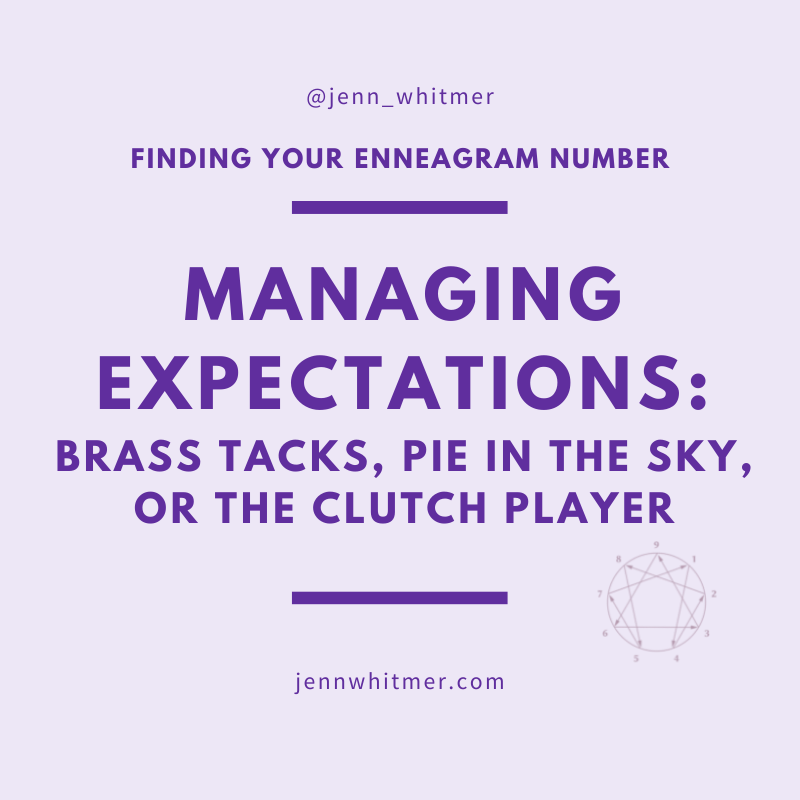Expectations kinda rule our lives. How we expect to relate to people or circumstances, how we feel about those expectations, and what we do to get our needs met. Google managing expectations, and you’ll find millions of words on the topic. (So, naturally, here are a few more!)
Managing expectations, how we relate to people or things is yet another onramp to the Enneagram. (If you missed the other posts, read the previous posts the Enneagram and Intelligence Centers and Coping with People.)
There are three styles of relating to people and circumstances. These are called the Object Relations or Harmony triads. Just as in the centers of intelligence and the interpersonal coping styles, we all have three styles available to use, but we’ve got one we’re going to pick up one first. It’s our cozy way because it feels the best and most comfortable.
And sometimes we don’t even realize there is a different way of getting our needs met.
Discovering your relational style takes a little bit of attention to how you try to get needs met in relationships and situations. Become an observer of how you respond to unmet expectations.
The Harmonic triads have lots of names, but I like these:
- Pragmatists: Getting Down to Brass Tacks
- Idealists: Pie in the Sky
- Relationists: The Clutch Player
How do you know which part of the harmony you play? Which one you reach for in managing expectations helps identify your dominant Enneagram type.
Pragmatists: Getting Down to Brass Tacks
3s, 6s, 9s
Also called the Attachment Triad
This group shares a sense of self based on deep attachments: to people, ideas, or objects. To remain feeling attached in relationships and circumstances, they will adapt to the important people or things in their life. They are pragmatic about getting needs met and manage their expectations by attaching.
- Is your sense of self attached to people or things you think are good?
- Do you adapt to important people or ideas to feel at peace?
- Do you manage expectations by attaching to a belief system or others’ expectations?
- Are you generally feeling attached and content?
- Do people describe you as down-to-earth and attached to day-to-day life?
- Do you think of yourself as pragmatic?
Idealists: Pie in the Sky
1s, 4s, 7s
Also called the Frustration Triad
This group shares the idea that they know what will make them happy, but they often feel like they can’t get it. They are disappointed and frustrated because their expectations are never fully met.
- Do you often think of what could be or what could have been?
- Do you know what makes you happy, but often feel like you don’t have it?
- Do ideals and utopia appeal to you?
- Do you see possibilities and options to go after a vision?
- Do you often feel frustrated when people or situations don’t meet your expectations?
- Do people describe you as Pollyanna, an eternal optimist, or Eeyore?
- Do you think of yourself as idealistic?
Relationists: The Clutch Player
2s, 5s, 8s
Also called the Rejection Triad
This group shares the belief that others don’t really understand their needs. They reject their own needs so they won’t be rejected again by others. They come in to make the clutch play with their amazing gift to feel like a valuable member of the world. They manage expectations of rejection by giving.
- Do you put aside your own needs to manage the expectations of others?
- Do you ever feel like you have only one gift to offer others so you aren’t rejected? Your care and love? Your thoughtful analysis and logic? Or your power and protection?
- Do you feel like others don’t understand your needs and expectations?
- Do you minimize what you feel or need to be appreciated by others?
- Is it hard for you to accept the care and support of others?
- Do you hesitant to share your feelings or needs or fears with others?
- Do you think of yourself as someone who offers your talents to relate to others?
Growth is available for each triad. For the Pragmatists, integrate higher qualities like hope, faith, and love over the details of life. For the Idealists, find joy in the present moment and all the different expressions of wholeness, joy, and perfection. For the Relationists, open up to vulnerability and the natural flow of giving and receiving love.
We all manage expectations, and you can see how these styles influence how we do that in relationships and circumstances! Observe yourself when your needs or expectations aren’t met. Your responses will point you toward your direction of growth.Let’s talk about Enneagram Coaching! Learn more about finding your number and schedule a free consultation.

COMMENTs:
0